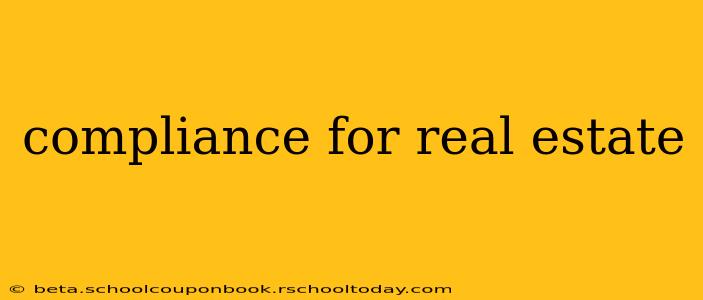The real estate industry is rife with regulations, making compliance a critical aspect of success and avoiding hefty fines or legal battles. This comprehensive guide delves into the key areas of real estate compliance, offering insights for agents, brokers, and property managers alike. Understanding and adhering to these regulations is not merely a legal obligation; it's a cornerstone of building trust with clients and maintaining a thriving business.
Key Areas of Real Estate Compliance
Real estate compliance is a multifaceted field, encompassing various federal, state, and local laws. Here are some of the most crucial areas:
1. Fair Housing Laws: Ensuring Equal Opportunity
Fair housing laws are paramount, prohibiting discrimination based on race, color, national origin, religion, sex, familial status, or disability. This extends to all aspects of real estate transactions, from advertising and marketing to property showings and loan applications.
- Key Considerations: Agents and brokers must be meticulously trained in fair housing practices. Advertising materials should be carefully reviewed to ensure they don't contain discriminatory language or imagery. Agents must treat all potential buyers and sellers equally, providing the same level of service and access to properties regardless of protected characteristics. Understanding and applying the principles of reasonable accommodation and modifications for individuals with disabilities is crucial.
2. Consumer Protection Laws: Transparency and Disclosure
Transparency and full disclosure are central to consumer protection laws in real estate. These laws vary by state but generally require agents to disclose all material facts about a property, including known defects or environmental hazards.
- Key Considerations: Accurate and complete disclosure is paramount. Agents must diligently investigate properties and document any potential issues. Disclosing known problems proactively prevents future legal complications. Familiarize yourself with your state's specific disclosure requirements and ensure all necessary documentation is completed accurately and promptly. This includes lead-based paint disclosures in older properties and environmental disclosures regarding potential hazards.
3. Agency Relationships: Defining Roles and Responsibilities
Clearly defining agency relationships is critical to avoiding conflicts of interest. Understanding the different types of agency (e.g., buyer's agent, seller's agent, dual agency) and adhering to the corresponding fiduciary duties is crucial.
- Key Considerations: Written agency agreements outlining the responsibilities and obligations of each party are essential. Transparency and open communication with clients about the agency relationship are paramount. Maintaining clear boundaries and avoiding conflicts of interest are crucial for maintaining ethical and legal compliance. Proper disclosure of any dual agency relationships is vital.
4. Advertising and Marketing: Truth in Advertising
Real estate advertising must be truthful and avoid deceptive practices. Exaggerated claims or misleading information can lead to legal issues.
- Key Considerations: All advertising materials must be accurate and supported by verifiable facts. Agents should avoid making unsubstantiated claims about property values or features. Compliance with advertising regulations specific to your state and local jurisdictions is mandatory.
5. Real Estate Transaction Records: Accurate Record Keeping
Maintaining accurate and complete records of all real estate transactions is crucial for compliance. This includes contracts, disclosures, and financial records.
- Key Considerations: Implement a robust record-keeping system that ensures all documents are properly organized, stored, and easily accessible. Adhere to all state and local requirements for record retention.
6. State-Specific Regulations: Understanding Local Laws
Real estate laws vary significantly by state. Understanding the specific regulations in your jurisdiction is essential.
- Key Considerations: Regularly review and update your understanding of state-specific real estate laws. Consult with legal counsel when needed to ensure compliance with all applicable regulations.
Staying Compliant: Best Practices
Maintaining compliance is an ongoing process. Here are some best practices to help you stay on top of regulations:
- Regular Training: Participate in continuing education courses to stay updated on changes in real estate laws.
- Legal Counsel: Consult with an attorney specializing in real estate law to address specific questions or concerns.
- Professional Organizations: Join professional organizations that provide resources and support for compliance.
- Internal Audits: Conduct periodic internal audits of your compliance procedures to identify areas for improvement.
This guide provides a general overview of real estate compliance. It's crucial to consult with legal professionals and relevant regulatory bodies for specific guidance tailored to your jurisdiction and circumstances. Prioritizing compliance is not just about avoiding penalties; it's about building trust, protecting clients, and ensuring the long-term success of your real estate business.
